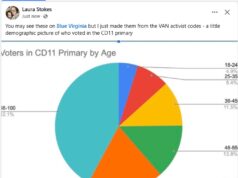Important thoughts from Arlington County Board member Christian Dorsey:
And so it goes, yet again. A law enforcement encounter with a non-combative and in this case fully restrained Black American results in their losing their life leaving their family and friends with unimaginable grief. And as the rest of us process the information about the death of George Floyd, there is the now predictable pattern where the initial shock gives way to sadness which begets anger and frustration, and mostly peaceful demonstrations against the systemic disregard for the dignity and humanity of persons of color. Then, there is a media spotlight on the violence, damage and destruction caused, in many cases, by provocateurs whose commitment to fighting systemic injustice is suspect at best.
And, if past is prologue, we will go back to a collective complacency until the inevitable next time. I say this not out of cynicism and frustration, though I am cynical and frustrated. I say it because we have been here before with the killings of Eric Garner, Tamir Rice, Freddie Gray, Sandra Bland, Walter Scott, Michael Brown, Breonna Taylor, Philando Castile, Samuel DuBose, Terence Crutcher, Eric Harris, Botham Jean, and hundreds of others in the last decade alone – and the countless others in our nation’s history. And let’s not forget that the disregard for black and brown lives in the name of law and order is not limited to police; it defined the reasons why Trayvon Martin, Ahmaud Arbery, Markeis McGlockton and Jordan Davis were murdered by self-appointed guarantors of law and order.
If this time is to be different, the outraged majority must demand a systemic, and not an episodic, response.
Holding the officer accountable for restraining George Floyd with a knee to his neck for over 8 minutes—long after he was unresponsive—is necessary, but not enough. The other officers who witnessed (and participated) in this assault also must be held to account for their total disregard for a human’s life. While justice on the back end would be a welcome departure from past practice, the fact remains that George Floyd is still dead. I want to prevent other people who look like me from joining the list that includes Mr. Floyd and too, too many others. That will only come with real, systemic change.
Systemic change requires that we orient our advocacy to demand reforms in how law enforcement officers are hired, trained and evaluated so that implicit bias awareness and psychological fitness are prerequisites for carrying a badge. Further, police departments must institute use of force policies that value all lives and have zero tolerance for transgressors.
Systemic change also means reversing the effects of so-called Stand Your Ground laws that have delegated to untrained and unfit civilians the responsibilities and power that should only be available to a well-trained police force.
Yet, the most important change that must occur will not come through policies or even legislation. People must look inward and seriously examine why they are so afraid of black and brown people. Why is it when we are bird watching, retrieving mail, swimming in a pool, walking down the street, or living in our own homes that you view us as a threat? Why do these routine activities see us being reported to police and losing our lives?
It is a question my daughters ask, as do the children of every black person in America. Yet that question needs to be seriously be pondered non-Blacks. We then need you to transform episodic outrage into all-the-time anti-racism. Read perspectives from authors of color; join groups that discuss race and identity; embrace the idea that injustice to others is a threat to justice for you; and consciously break through barriers that divide us by race and income and engage in ways that allow us to appreciate one another’s humanity. Most Black people I know—I among them—will do all we can to support and work with those who want to do their part in stopping the systemic dehumanization of black life.












